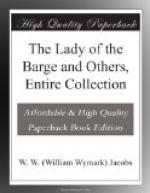He took the other’s wrists in his hand, and suddenly holding them in the grip of a vice, whipped out something from his pocket—something hard and cold, which snapped suddenly on Burleigh’s wrists, and held them fast.
“That’s right,” said the sergeant; “keep quiet.”
The constable turned round in amaze; Burleigh sprang toward him furiously.
“Take these things off!” he choked. “Have you gone mad? Take them off!”
“All in good time,” said the sergeant.
“Take them off!” cried Burleigh again.
For answer the sergeant took him in a powerful grip, and staring steadily at his white face and gleaming eyes, forced him to the other end of the room and pushed him into a chair.
“Collins,” he said, sharply.
“Sir?” said the astonished subordinate.
“Run to the doctor at the corner hard as you can run!” said the other. “This man is not dead!”
As the man left the room the sergeant took up the glass of spirits he had poured out, and kneeling down by Fletcher again, raised his head and tried to pour a little down his throat. Burleigh, sitting in his corner, watched like one in a trance. He saw the constable return with the breathless surgeon, saw the three men bending over Fletcher, and then saw the eyes of the dying man open and the lips of the dying man move. He was conscious that the sergeant made some notes in a pocket-book, and that all three men eyed him closely. The sergeant stepped toward him and placed his hand on his shoulder, and obedient to the touch, he arose and went with him out into the night.
CAPTAIN ROGERS
A man came slowly over the old stone bridge, and averting his gaze from the dark river with its silent craft, looked with some satisfaction toward the feeble lights of the small town on the other side. He walked with the painful, forced step of one who has already trudged far. His worsted hose, where they were not darned, were in holes, and his coat and knee-breeches were rusty with much wear, but he straightened himself as he reached the end of the bridge and stepped out bravely to the taverns which stood in a row facing the quay.
He passed the “Queen Anne”—a mere beershop—without pausing, and after a glance apiece at the “Royal George” and the “Trusty Anchor,” kept on his way to where the “Golden Key” hung out a gilded emblem. It was the best house in Riverstone, and patronized by the gentry, but he adjusted his faded coat, and with a swaggering air entered and walked boldly into the coffee-room.
The room was empty, but a bright fire afforded a pleasant change to the chill October air outside. He drew up a chair, and placing his feet on the fender, exposed his tattered soles to the blaze, as a waiter who had just seen him enter the room came and stood aggressively inside the door.
“Brandy and water,” said the stranger; “hot.”




